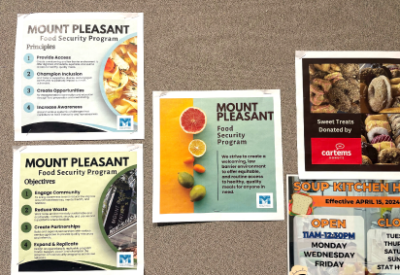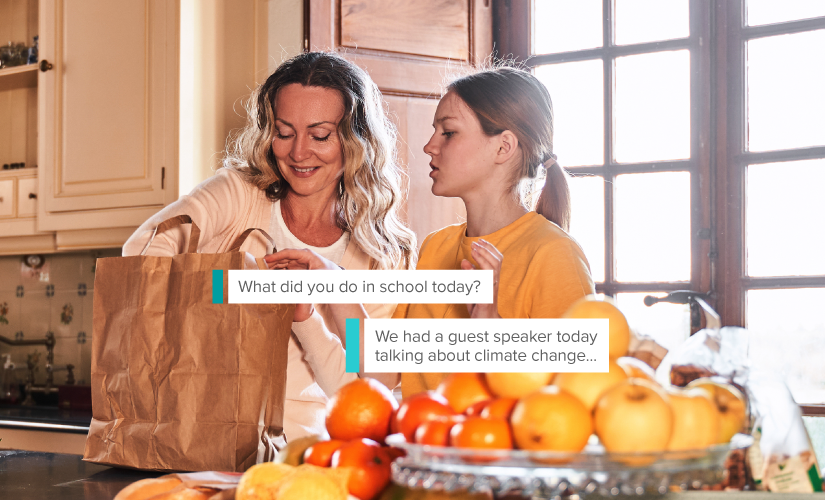Simple Everyday Ways to Talk to Your Kids About Giving
February 03, 2025
9 min read
What You’ll Discover in This Blog:
- Everyday moments are opportunities to talk about giving. You don’t need to be an expert—parenting is about learning as you go, and conversations about generosity can happen naturally in daily life.
- Car rides and news stories can spark meaningful discussions. Listening to current events together can lead to conversations about causes like disaster relief, homelessness, or community support. Asking open-ended questions helps kids think critically and explore ways to contribute.
- Your neighbourhood is full of charitable organizations. A simple walk can reveal local charities, schools, libraries, and places of worship that support meaningful causes. Encouraging kids to recognize and engage with these organizations builds awareness and connection.
- Dinner table conversations can inspire giving. Talking about school activities, acts of kindness, or challenges faced by friends and family can help kids reflect on ways to help others. Asking thoughtful questions encourages generosity and empathy.
- Small conversations lead to lasting impact. Regularly engaging in discussions about giving helps kids develop a deeper understanding of generosity and how they can make a difference in the world.
Becoming a parent for the first time doesn’t come with a manual—you learn as you go. From teaching your kids how to share to helping them navigate friendships or dream about their future careers, parenting is all about figuring it out step by step.
How do you approach these big topics? Chances are, you start by simply talking to your kids—this opens the door to conversation, you keep going, and adjust as you learn together. Talking to your kids about charitable giving works the same way.
You don’t need to be an expert to start the conversation. Opportunities to talk about giving are already all around you—in your daily life, during your morning commute, while walking through your neighbourhood, or even over dinner.
These everyday moments are perfect chances to reflect and talk about the importance of giving. These conversations can help build understanding, spark curiosity, and encourage your kids to think about the world around them, what matters to them, and how they can make a difference.
Here are three simple, everyday moments to talk to your kids about giving.
Using News Stories to Inspire Conversations on Your Drive
Whether it is to school, practice, activities or friends’ houses, parents often find themselves spending hours a week as a personal chauffeur for their kids. Tuning into the radio during this time together is a great way to learn more about what is happening in the world and spark conversations around giving.
Think about some of the stories you’ve heard over the past year—natural disasters like floods, earthquakes, and fires, a lost hiker on the mountain, homelessness in your community, or a holiday toy drive for families in need. These moments offer the perfect opportunity to talk to your kids about specific causes and whether they’d like to help.
Let’s use forest fires as an example. Here are a few questions you could ask to start the conversation:
- What do you know about this?
- What do you think are some of the challenges they face?
- Would you consider helping with a cause like this?
- What do you think could be done to make a difference?
- Do you think there are charities that can help with that?
- What would you like to know more about?
If your child identifies a cause they care about and wants to help, it’s a great opportunity for you to explore it together. Which charities are supporting this cause? What are some ways you could get involved?
Would they like to help by giving their time? What would they do and how? Would they like to donate to charities helping the cause through a Charitable Allowance?
These questions can guide your child in finding meaningful ways to contribute while learning about the impact they can make.
Charity is Closer Than You Think: A Neighbourhood Walk
Your community is likely full of charities and other qualified donees doing great work. Take a walk around your neighbourhood with your kids and see how many charitable organizations or activities you can spot. How many can you identify together?
The neighbourhood charity walk can be a fun and meaningful learning experience for both you and your child. Consider some of the places in your community that might be Canadian registered charities or qualified donees you can support:
- Places of Worship: Churches, mosques, temples, and other faith-based organizations.
- Schools: Public schools can be helped through school districts whereas private schools often have their own charity registered.
- Neighbourhood Houses: These organizations provide services and resources to support the local community.
- Libraries: Your local library may have a foundation that enhances programs, services, and spaces.

Ask yourselves these questions:
- Is there an organization that I care about or feel a personal connection to?
- Are there any organizations in our neighbourhood that you want to learn more about?
- What are some ways they’re giving back?
- Can we contribute by offering our time, talent, treasure, or ties?
- How can we learn more about what they do? Could we visit? Ask them questions directly?
By exploring what’s charitable in your area, you’re teaching your kids about charity and building a deeper understanding of your community. It’s an opportunity to come up with family giving ideas and discover ways to make a difference together.
Conversations at the Dinner Table: Sparking Ideas for Giving
 Gathering around the dinner table is a special time to reconnect with your family after a busy day. It’s a great opportunity to engage in meaningful conversations and talk to your kids about giving. Charitable giving might be something you’re already talking about.
Gathering around the dinner table is a special time to reconnect with your family after a busy day. It’s a great opportunity to engage in meaningful conversations and talk to your kids about giving. Charitable giving might be something you’re already talking about.
Here are some common questions that come up at the dinner table, which could lead to thoughtful discussions about giving back:
What happened at school today?
Kids are often introduced to charitable activities at school, whether it’s fundraising for the Terry Fox Run, participating in anti-bullying day, working in a community garden, or discussing important causes in class, like health or food security.
This is a great moment to connect with your child. Ask, “What did you learn about this cause or activity?” and “Is this something that matters to you?” If not, explore together what they do care about. You could also share your own experiences and motivations for giving back, helping them see how they can make a difference too.
More follow-up questions about the school day:
- Did you help anyone today or did someone help you?
- Who was kind to you today, and how did it make you feel?
- Did your class talk about helping others or giving back today? What did you think?
- Is there anything you learned today that you’d like to teach or share with someone else?
- If you could give anything to anyone in your class, what would it be and why?
What’s going on with your family, friends, and the people around you?
Many times, the causes we care about are closely tied to the people around us. Maybe an aunt is battling cancer, a classmate can’t afford after-school sports, or a family friend is managing diabetes. You can use these conversations to highlight how we can help in these situations.
- Would you like to help? How do you think you could do so?
- Have you heard about anyone in your school or community doing something to help others?
- If you could create a project to help others, what would it be about, and who would it help?
Talking to your kids about charitable giving can begin with simple, everyday moments. By consistently engaging in these conversations, you and your children will gain a deeper understanding of how you can make a positive impact in the world.
So, here’s your call to action: What everyday moment will you use to spark the idea of giving in your kids?
Empower your kids to make a difference
Kids have an incredible ability to care and take action when given the right tools. A monthly Charitable Allowance gives them the opportunity to do just that. With your guidance, your kids can use the allowance to support any Canadian registered charity and discover how good it feels to give back. Along the way, they’ll learn about social responsibility, financial literacy, and how to make thoughtful choices. Learn more about Charitable Allowance.

